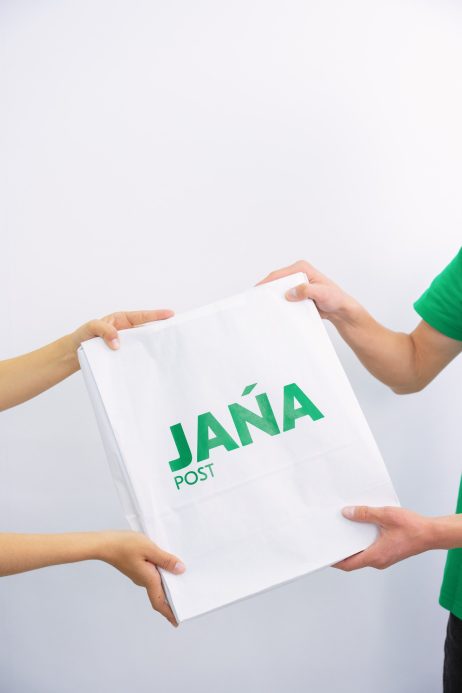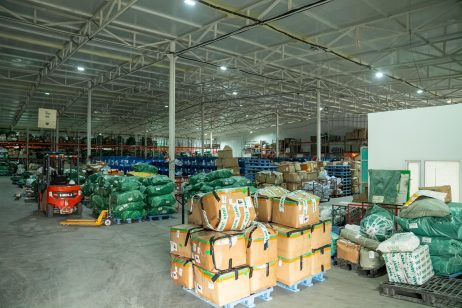When Jana Post founders Serzhan Tokay, Bolatbek Dalelkhanuly, and Almas Rysbekov launched their business in 2022, the prospect of officially partnering with the mega-platform PinDuoDuo and Alibaba and shipping over 5 million parcels in three years seemed feasible, but extremely challenging to implement. At that time the Kazakhstan market was just beginning to recover from the pandemic: consumer demand was reviving, small and medium businesses were gradually getting back on their feet, and e-commerce and logistics were reaching new levels of growth despite the challenging macroeconomic and geopolitical situation. During the lockdown, people had become accustomed to the convenience and affordability of shopping through apps, and the popularity of digital and delivery services grew, becoming a sustainable trend.

Today, Jana Post represents 6.5 billion tenge (about USD12 million) in investments, a highly qualified team of 200 people, the capacity to sort 4 million parcels per month, 500 branches in Kazakhstan, 500,000 users, two modern sorting centers, over 2,000 jobs in Kazakhstan alone, and expansion into the markets of Kyrgyzstan, Uzbekistan and Turkmenistan. All of this is the result not only of the countless efforts of numerous professionals but also of sound goal-setting. The company’s founders define the mission of the company simply: to empower people through the digitalization of Kazakhstan’s logistics system. This says it all. Jana Post has been committed to the future from the very beginning, always focused on people, developing its business by helping them to enjoy a comfortable shopping experience while saving money.
This approach is largely due to Jana Post’s European roots. Francisco Parrilla, a representative of Portola Cyprus Limited, admits that the most important thing in such a business is how effectively the business model is built and thought out, as well as the success and timeliness of the strategic decisions made by management. All of this is present in the Jana Post project.
This is especially relevant in the context of Kazakhstan’s development of international trade relations. Thus, speaking at a meeting of the Kazakh-Chinese Business Council on September 2, 2025, Kazakh President Kassym-Jomart Tokayev emphasized that Kazakhstan “fully supports and actively participates in the implementation of President Xi Jinping’s global initiative, ‘One Belt, One Road.’” Among the key areas are transportation and logistics. Tokayev also noted that Kazakhstan accounts for approximately 85 percent of ground transit traffic between China and Europe, and that with the addition of second tracks on the Dostyk-Moiynty railway section, the corridor’s capacity will increase fivefold. This context makes the development of logistics operators, particularly in the private sector, extremely significant – not only for competition but also as a contribution to economic diversification, stability, and regional income growth.

The secret to Jana Post’s popularity in Kazakhstan lies in the speed and simplicity of its services. Its intuitive and interactive portal allows customers to easily order goods from Chinese marketplaces such as Pinduoduo, 1688, Temu, TaoBao, and JD.com, and then track their delivery in real time. More than 2 million customers visit the app daily, and many of them want not only to buy but also to collaborate.
“Our goal is to develop an ecosystem with small and medium-sized businesses, creating jobs and opening up new opportunities. We provide our partners – in Kazakhstan, Uzbekistan, and Kyrgyzstan – with reliable growth prospects and ready-made IT solutions. This way, we impact not only the market but also people’s lives, which fully reflects the company’s mission,” explains CEO Almas Rysbekov.
Growing from a shared dream of a socially important business, Jana Post has been training local entrepreneurs in e-commerce since its launch. More than 280 franchise branches have already opened across Kazakhstan, Uzbekistan, and Kyrgyzstan. The branches utilize a technologically advanced zero-touch customer model and offer extremely fast order fulfillment. Multi-million investments are being directed into the construction of a logistics center in Almaty, scheduled to become operational in 2026.
Expanding logistics truly requires extensive infrastructure: warehouses, branches, transportation services, IT solutions and customer service support. Jana Post is thus stimulating the development of transportation, storage, and employment in the service sector. It is worth noting that the country already benefits from the established business processes of the national operator, which sets industry standards and provides a solid foundation for the market’s development.
Jana Post is also ready to share its experience and scale its IT startup. Specifically, the company is actively working to implement modern solutions for tracking, optimizing delivery routes, and improving overall process efficiency. It is also constantly improving its mobile app, available on Google Play and the App Store.

It is notable that Jana Post incorporates business process elements similar to those of the state operator KazPost. This includes applying service standards at pick-up points as well as client interfaces, enabling the company to compete in the logistics market not only on price but also on service quality. Importantly, Jana Post not only delivers goods but also interacts with the regulatory environment, helping its Chinese partners properly enter the Kazakhstan market. The company advises them on registration, customs, taxes, and import regulations, and makes interfaces and instructions accessible, helping them comply with legal requirements and standards, thereby reducing the “informal costs” associated with violations, fines, and the risk of return or blocking of goods.
In Central Asia, investors are interested not only in Kazakhstan but in the entire region, which today essentially represents a “blue ocean” strategically located between Europe, Asia, and the Middle East. All this provides Kazakhstan with direct access to the main markets of the Eurasian Economic Union, as well as China and the Caspian region.
Thus, Jana Post’s economic significance extends far beyond its courier service. The company is part of a larger process in which Kazakhstan is developing new growth drivers: logistics, digital trade, integration with global supply chains, a shift toward innovation, and a reduction in dependence on raw materials. Companies like Jana Post are not just local startups but also serve as vital links between global megaprojects. Their success demonstrates Kazakhstan’s potential not only as a transit hub but also as a developing platform for services and trade in Central Asia.
This is a sponsored article.





























